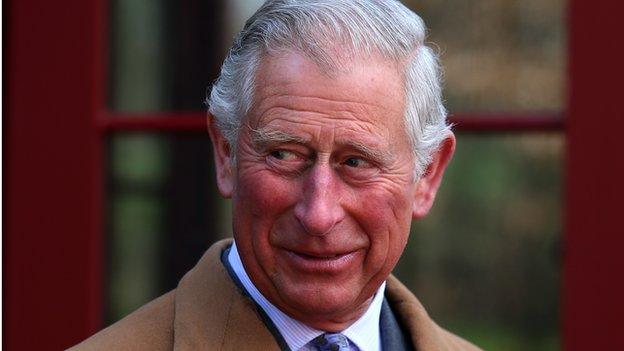Prince Charles's letters reveal hospital and building concerns
- Published
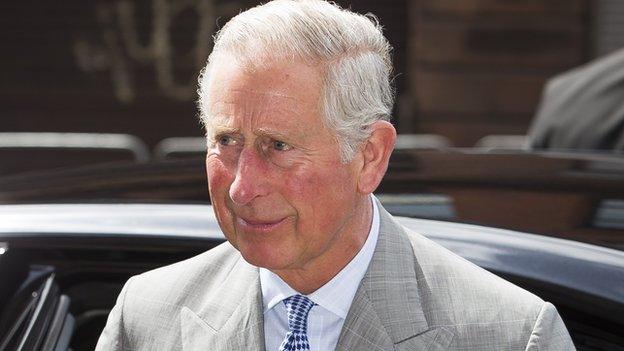
The release of Prince Charles's private letters follows a decade-long campaign by the Guardian
A second batch of private letters sent by the Prince of Wales to government ministers has been published.
Six new letters written by Prince Charles, external are on subjects including hospital food, complementary medicines and the future of historic buildings.
Clarence House said the letters - all dated between 2007 and 2009 - showed his range of concerns and interests.
It follows last month's publication of 27 letters, coming after a decade-long campaign by the Guardian, external newspaper.
The government's veto on the publication of the letters was declared unlawful by the Court of Appeal last year - a decision which was upheld by the Supreme Court in March.
A total of 17 new letters - including responses from Labour government ministers and letters sent on behalf of the prince - have now been published.
Clarence House said the letters show the Prince of Wales "expressing concern about issues that he has raised in public".
"In all these cases, the Prince of Wales is raising issues of public concern, and trying to find practical ways to address the issues," a spokesman said.

Analysis
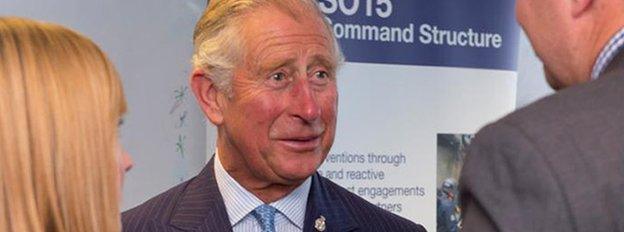
By Peter Hunt, BBC royal correspondent
A second set of letters. A second glimpse of the normally private exchanges between a prince and politicians.
The latest letters to be released provide an insight into Prince Charles' thinking and into how the recipients responded.
His intervention in support of hospitals offering homeopathic services will attract most attention.
The prince's supporters argue he champions matters of public concern.
His critics maintain he's abusing his position - meddling in the politically sensitive area of NHS funding.
The man destined to one day occupy the unifying role of head of state continues to divide opinion.

The latest correspondence covers topics including hospital food, affordable rural housing and climate change:
Historic buildings
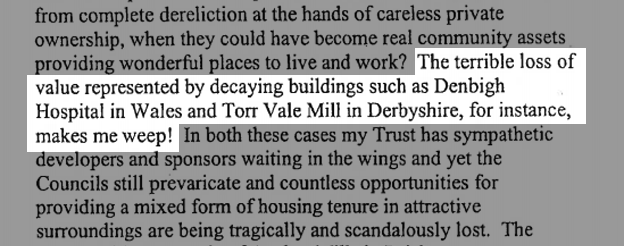
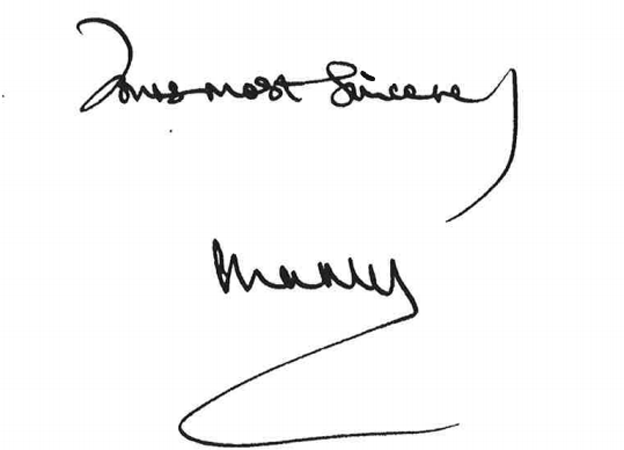
In one letter, Prince Charles revealed his upset at seeing "decaying" historic buildings - writing that it "makes me weep".
In the letter, sent in March 2008 to then Housing and Planning Minister Caroline Flint, he wrote of his "enormous frustration" over the "reluctance or inability" of councils to save historic buildings from "complete dereliction at the hands of careless private ownership".
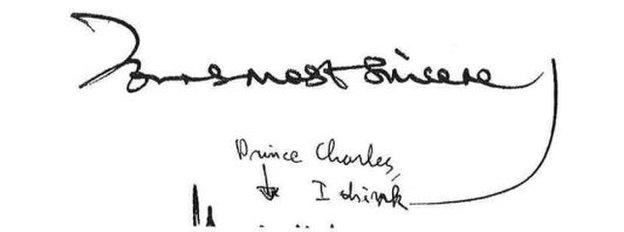
Replying, Ms Flint said she "understood" the prince's concerns, saying such buildings were "irreplaceable".
It was a subject he returned to in June 2009, when the prince wrote to the then Culture, Media and Sport Secretary Ben Bradshaw to suggest a discussion about the regeneration of redundant buildings of historic and architectural importance.
"As many of these historic sites are often in fairly deprived areas, their re-vitalisation can make a big difference," he said.
The signature of Prince Charles is missing at the bottom of the letter, where somebody has added an arrow and the words: "Prince Charles, I think."

Complementary medicines



In a letter to Alan Johnson, then health secretary, from 19 September 2007, the prince said he "cannot bear people suffering unnecessarily when a complementary approach could make a real difference".
There should be a "whole person" approach to the treatment of illness in the UK rather than a "reductionist" focus on the ailment, he wrote.
He also raised concerns over the threat to NHS homeopathic hospitals, suggesting the government set up an "exploratory integrated health project" in England - similar to a pilot scheme in Northern Ireland.
Mr Johnson replied, saying he was "interested" to hear about the pilot, saying he would "consider your suggestion of an exploratory project in England."

Poisonous weed
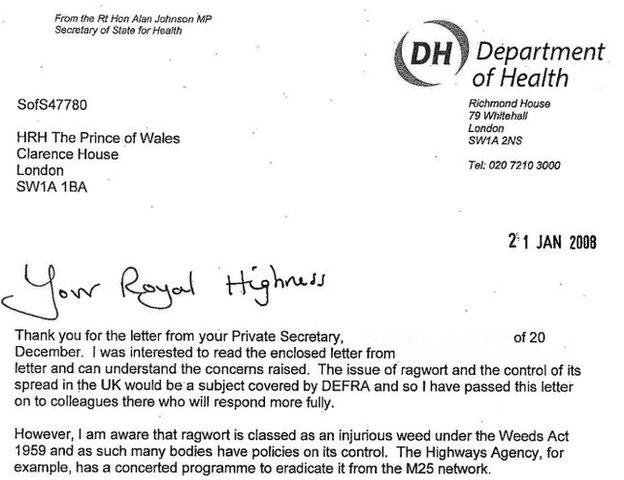
The letters also reveal correspondence between Mr Johnson and the prince about the poisonous weed ragwort and its control and spread in the UK.
The then health secretary said the risks of ragwort - which can pose a threat to livestock - in herbal medicines were "well recognised".
He reassured the prince that ragwort was classed as an "injurious weed" and programmes were in place to eradicate it.
Mr Johnson - who was responding to a letter from Prince Charles's private secretary - said he hoped his letter would give the prince "some reassurance that this issue is taken very seriously".

Hospital food
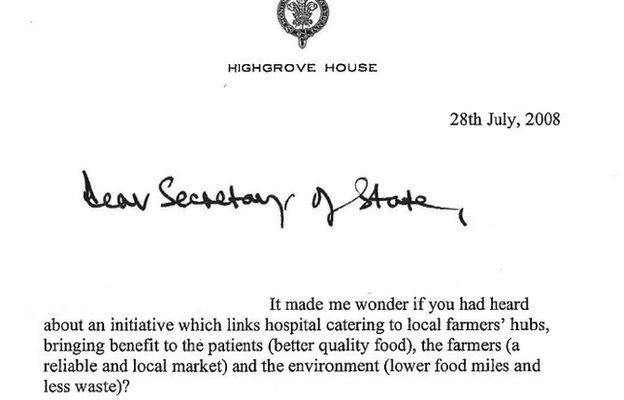
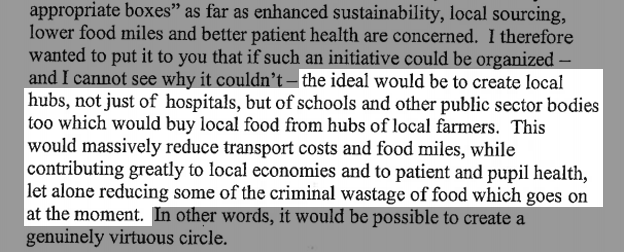
In a further letter to Mr Johnson, dated 28 July, 2008, the prince addressed the issue of hospital food - saying NHS caterers could be linked to "farmers' hubs" to buy local produce for patients.
"This would massively reduce transport costs and food miles, while contributing greatly to local economies and to patient and pupil health, let alone reducing some of the criminal food wastage which goes on at the moment," he said.
Mr Johnson replied, saying he was "very interested" to hear about initiatives the prince had raised in London and Cornwall concerning hospital catering.
He wrote: "I would be very happy to discuss these issues and other matters with you in more detail."

Affordable housing
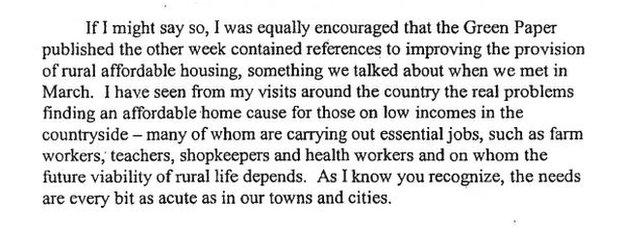
In August 2007, in a letter to Yvette Cooper, then housing and planning minister, the prince wrote about the "real problems" caused by trying to find an affordable home for those on low incomes in rural areas.
Many of these "are carrying out essential jobs, such as farm workers, teachers, shopkeepers and health workers... on whom the future viability of rural life depends," he said.
He highlighted the work of his Affordable Rural Housing Initiative in tackling the issue of cheaper homes for countryside workers and wrote of his support for government work on "eco towns".
Ms Cooper said she was "delighted" by his support, adding that the government was "ready to help" on issues to do with rural housing "in any way we can".

Ministers' etiquette
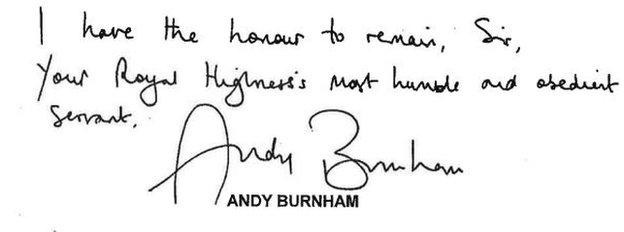
Labour's former Health Secretary Andy Burnham signed off his reply to a letter sent by the Prince of Wales with a handwritten note.
Mr Burnham ended the typed letter, sent in June 2009, by writing: "I have the honour to remain, Sir, Your Royal Highness's most humble and obedient servant."
The message was in line with British social etiquette as outlined by Debrett's, the social skills experts.
- Published13 May 2015
